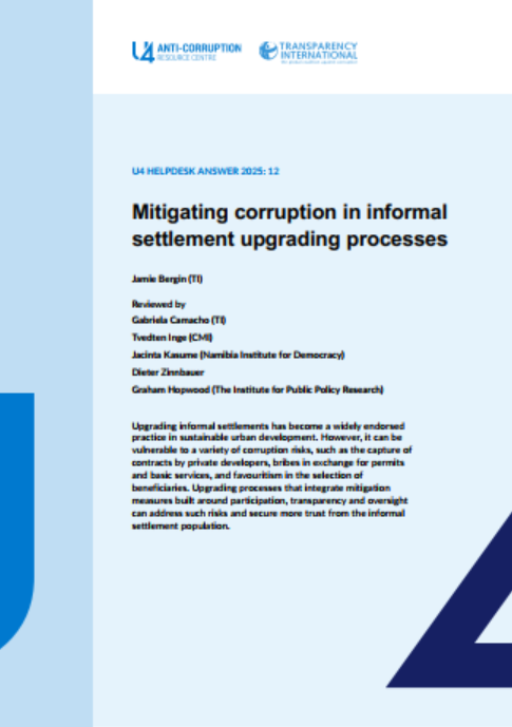
This Anti-Corruption Helpdesk brief was produced in response to a query from a U4 Partner Agency. The U4 Helpdesk is operated by Transparency International in collaboration with the U4 Anti-Corruption Resource Centre based at the Chr. Michelsen Institute.
Query
Please provide a summary of the key corruption risks and potential mitigation measures for informal settlement upgrading, including a focus on the case of Namibia.
Summary
Upgrading informal settlements has become a widely endorsed practice in sustainable urban development. However, it can be vulnerable to a variety of corruption risks, such as the capture of contracts by private developers, bribes in exchange for permits and basic services, and favouritism in the selection of beneficiaries. Upgrading processes that integrate mitigation measures built around participation, transparency and oversight can address such risks and secure more trust from the informal settlement population.
Main Points
- Upgrading informal settlements (or ‘slums’) has become a widely endorsed practice within urban development, as reflected in Sustainable Development Goal 11. An alternative to clearances and evictions, upgrading generally constitutes a set of measures to improve conditions in informal settlements, including by ensuring greater tenure security for dwellers.
- Corruption can contribute to the development of informal settlements as well as shape day-to-day life in them. Even where an upgrading intervention is prima facie well intentioned, it can face corruption vulnerabilities across the project implementation cycle.
- Key among these are the embezzlement and misappropriation of funds allocated to upgrading projects. Furthermore, public officials may demand bribes in exchange for permits and basic services, such as water, sanitation and electricity.
- Public actors typically enlist private actors to provide upgrading services and infrastructure, but state capture and patronage of political allies can present risks, meaning contracts are awarded inefficiently that result in inferior quality and exorbitant rents.
- Given the typically high population densities, informal settlements are often sites for intense political competition. Candidates may make promises regarding upgrading in return for votes during electoral cycles or engage in forms of clientelism that unfairly advantages some informal settlement dwellers over others.
- These forms of corruption all serve to distort the outcomes of upgrading, including by aggravating inequalities and entrenching existing clientelist networks, ultimately failing to alleviate the situation of intended beneficiaries.
- Mitigation measures include fostering greater integrity among key decision-makers and integrating risk management in upgrading project cycles.
- Independent oversight bodies, independent oversight mechanisms and community led monitoring can help to ensure greater accountability.
- Greater transparency over upgrading funds and beneficiary selection, as well as meaningful participatory decision-making that treats informal settlement dwellers as active agents of change, can address low levels of trust and foster more buy-in. The existence of some cases of corruption in Namibian housing initiatives suggests informal settlement upgrading processes may face similar risks. Some studies point to promising examples of informal settlement upgrading processes led at the municipal level in Namibia and to other areas for improvement.
Authors
Jamie Bergin
Reviewed by
Gabriela Camacho (TI)
Tvedten Inge (CMI)
Jacinta Kasume (Namibia Institute for Democracy)
Dieter Zinnbauer
Graham Hopwood (The Institute for Public Policy Research)
Date
29/04/2025

